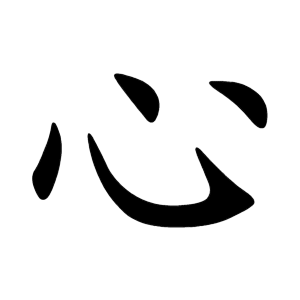心
- heart, mind;
- center, core;
It represents the concept of the heart or the mind as the center of emotions and thoughts.
Etymology
It is a pictogram (ideogram) originally modeled after the shape of a human heart. The character evolved over time into its modern form.
Usage in Korean
Because it represents “heart” or “mind,” it frequently appears as a radical in characters related to emotions or feelings. Examples include:
愛 (love)
惡 (evil)
怒 (anger)
恐 (fear)
怨 (resentment)
恨 (regret)
恥 (shame)
感 (feel)
慌 (panic)
憘 (joy)
忍 (endure)
戀 (long for)
Almost all emotion-related characters contain the heart radical (忄).
If you combine two 心 characters, you get 㤈 (meaning “heartache”), and three 心 characters combine to form 惢 (meaning “flower stamens”).
Additional notes
Although it is a simple character, it can actually be tricky to write beautifully by hand.
To write a nice 心 character, it’s recommended to shape the central "indentation" stroke like a reversed check mark tilted sideways, with the longer stroke curved inward toward the lower left. The three dots should be placed evenly along an imaginary horizontal line that crosses the middle of the indentation. One dot is placed to the left of the indentation, one inside the concave space, and the last to the right. Avoid placing the middle dot too high, as it distorts the shape.
When writing, start with the left dot. After some practice, writing it well becomes easier.
Alternative forms
Similar shape characters
Characters with 心
- 怒–to get angry, to rage, anger, wrath, fury, to scold, to rebuke.
- 思–to think, to reflect, to long fo
- 怠–to be lazy, to neglect
- 急–urgent, hasty, to rush, to press, to be anxious
- 怨–to resent, to bear a grudge
- 恆–constant, regular, perpetual, always, unchanging, lasting
- 恒–constant, unchanging, lasting, to extend, to pervade
- 恢–broad, vast, expansive, open-minded, to recover or restore
- 恤–to pity, to feel compassion, to console, to comfort, to relieve,
- 恨–resentment, deep regret, rancor, to regret, to repent
- 恰–just, exactly, appropriate, suitable
- 恐–fear, dread, to be afraid
- 恕–to forgive
- 恣–to act at will, unrestrained, indulgent, presumptuous
- 恥–shame, disgrace, to feel ashamed
- 恩–grace, favor, benevolence, kindness
- 恭–respectful, reverent, courteous
- 息–to breathe, to rest, to live
- 悔–to repent, to regret, to feel remorse
- 悖–to go against, to defy
- 悚–to fear, to be frightened, to feel alarmed
- 悟–to awaken, to realize, to attain insight
- 想–to think, to consider, to imagine, to long for
- 愁–sorrow, anxiety, melancholy, worry, to grieve
- 意–intention, meaning, thought, idea, will
- 愚–foolish, stupid, ignorant
- 愛–love, affection; to cherish, to value
- 感–to feel, to sense
- 愼–to be cautious, to act with care
- 慈–affection, kindness, benevolence, maternal love
- 慌–to be flustered, to panic, to be bewildered or in confusion, to be hurried, pressed, in a rush
- 慧–wisdom, intelligence, sagacity, keen insight
- 慮–to think, to consider, to weigh
- 慰–to comfort, to console, to soothe, to reassure, to calm
- 慶–joyous occasion, celebration, festivity
- 慾–desire, craving, greed, to covet, to long for
- 憂–sorrow, worry, grief, concern
- 憎–to hate, to resent, to loathe
- 憤–to be indignant, resentful, angry
- 憧–to yearn for, to long for
- 憫–to pity, to feel compassion, to sympathize
- 憬–to awaken, to realize, to long for
Words that derived from 心
- 결심(決心)–decision; resolution; determination
- 고심(苦心)–consideration; contemplation; deliberation
- 관심(關心)–interest; attention
- 구심력(求心力)–centripetal force
- 내심(內心)–heart; back of one's mind
- 본심(本心)–original mind; real intention; one's heart; heart; truth
- 상심(傷心)–heartbreak; grief
- 생심(生心)–spirit mind
- 수심(愁心)–anxiety; worry
- 심(心)–dumpling; core; string; fiber; interlining; lead; refill; wick
- 심기(心氣)–humor; mood; mind
- 심령(心靈)–mind; spirit; soul; being psychic
- 심리(心理)–mentality; psychology
- 심성(心性)–nature; disposition
- 심신(心身)–body and soul
- 심장(心臟)–heart
- 심정(心情)–shimjeong; feeling; thought; temper
- 안심(安心)–relief; peace of mind; assurance
- 애국심(愛國心)–patriotism
- 야심(野心)–ambition; aspiration; vulgarity; meanness
- 양심(良心)–conscience
- 열심(熱心)–dedication
- 열심히(熱心히)–hard; diligently; zealously
- 원심력(遠心力)–centrifugal force
- 육심(肉心)–physical mind
- 의심(疑心)–doubt; distrust; mistrust
- 의심되다(疑心되다)–have a doubt; doubt; be doubtful of
- 일심(一心)–one mind; wholeheartedness
- 적대심(敵對心)–hostility
- 점심(點心)–lunch; afternoon
- 점심밥(點心밥)–lunch
- 조심(操心)–caution; carefulness
- 조심성(操心性)–carefulness; cautiousness
- 중심(中心)–center; confidence
- 중심부(中心部)–center; central area; core
- 중심인물(中心人物)–central figure; central character
- 진심(眞心)–truth; sincerity
- 핵심(核心)–key; core; center
- 心 (P)
- ⿲ 丿 ⿺ 乚 丶 丶
- ⿲ 丿 ⿺ ㇃ 丶 丶
